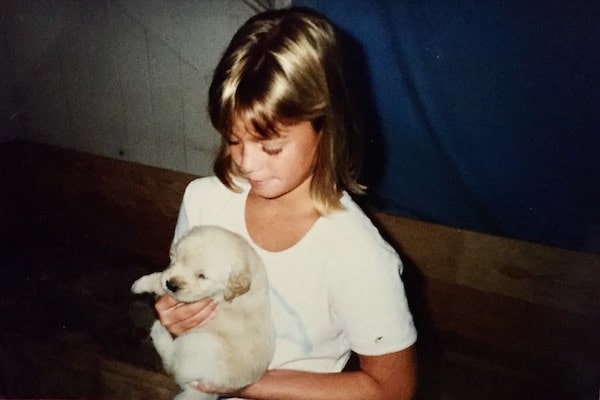Even though he’s been gone for more than 20 years, I often dream of my childhood dog Jake, a Golden Retriever whose glossy coat was the color of corn silk and glittered in the sun. We brought the roly-poly puppy home when I was just 10 years old, and the two of us grew up together. I was in charge of walking him, feeding him, and grooming him — a condition my parents made me agree to before giving in to my incessant pleas for a puppy. I taught him how to sit, lie down, shake, and roll over. He let me dress him up with props and sat motionless while I staged “photoshoots” on our front lawn. He was silly, mischievous, happy-go-lucky, and loyal. He was my best friend. I cried for days when we lost him to cancer when he was just 8 years old.

I loved my sweet puppy Jake. (Photo courtesy Jackie Brown)
My experience was not unique. Many of us grew up with a dog, maybe more than one. Odds are, you shared your childhood with not just a dog, but a truly special dog. One you still miss, no matter how many years have passed since he or she crossed over the Rainbow Bridge. As it turns out, our relationships with our dogs, especially in our formative years, might have an even greater impact than we realize.
A recent study looked at the relationships children have with family pets, and the results were eye-opening. It turns out that many children value the companionship of their pet even more than the companionship of their sibling. They also seem to get along better with their pets than with their human brothers and sisters.
“These findings add to the growing evidence that children’s relationships with their pets are among their strongest and most positive relationships,” said the study’s lead researcher Matt Cassels, a student at University of Cambridge who is working toward his PhD in psychiatry. “This further proves that pets may be a valuable social resource for children, and may have a positive influence on their social adjustment and emotional well-being. Ultimately, the findings of this research could enable the field of human-animal interaction to explore further how animals contribute to healthy child development.”
The study was conducted in collaboration with the Waltham Centre for Pet Nutrition (part of Mars Petcare) and the Economic and Social Research Council, and was part of a larger study called the Toddlers Up Project, a 10-year longitudinal study of children’s social and emotional development led by Professor Claire Hughes of the University of Cambridge Centre for Family Research. Included in the study were 12-year-old children from 77 families. Each of the participating families had two or more children, and one or more pets.

Jake was my best friend. (Photo courtesy Jackie Brown)
The kids surveyed reported greater satisfaction and less conflict with their pets than with their siblings. Children with dogs reported even lower levels of conflict and higher levels of satisfaction than kids with other species of pets.
“There are many ways that dogs in particular inspire deeper connections to children, stemming from the thousands of years during which dogs have been domesticated to live in close proximity to people, making them fully tuned into human behavior,” Cassels said. “Dogs are social animals that enjoy and thrive on positive human contact, and most dogs are fully integrated into families’ lives. Unlike most other pets, dogs need regular exercise, encouraging healthy behavior in their owners, as well. Being able to explore the world, enjoy the great outdoors and meet new people together strengthens the bond between children and dog.”
If you have kids and dogs at home, you probably already see the special bond they share. You can do even more to cultivate that special relationship, allowing it to blossom into something that will have a lasting effect on your children now and well into adulthood.
“Educating children on how to appropriately behave around and interact with dogs is one of the first steps to a positive relationship and part of being a responsible pet owner,” Cassels said. “Parents should teach their children how to recognize behavioral cues from their pets, not only happy and relaxed, but also when the dog is feeling anxious or fearful. Parents can also teach children to respect their pet’s behavior and environment by not interfering when they’re eating or sleeping, and providing a safe quiet space where the dog can go to be not disturbed. Encouraging children to spend time with their pets by getting involved in age-appropriate responsibilities, such as walking, feeding, or grooming is another great way to foster a strong relationship.”
Thanks to all of the “dog chores” I did as a kid — the walking, grooming, playing, and training — the bond forged between Jake and I can never be broken, not even by death. I’ll always remember my “Jakers,” and today, as I watch my own young son growing up with our Miniature Poodle Jäger, I can already see their special relationship starting to grow. It’s almost hard to believe but one day, my little guy will be a grown man dreaming of his own special childhood dog. What a blessing it is.
And I have to admit that despite the results of this recent study, I had a pretty great relationship with my brother, both growing up and now. Sure, we fought back then (what siblings don’t), but we also played and laughed together. I can’t say that my relationship with my dog Jake was better than my relationship with my brother, but I can say that it was profound! Maybe I should ask my brother what he thinks! Hopefully, I beat out the dog in the relationship rankings.
The post New Study Finds That Tweens Would Much Rather Hang Out With Their Pets Than Their Siblings appeared first on Dogster.
No comments:
Post a Comment